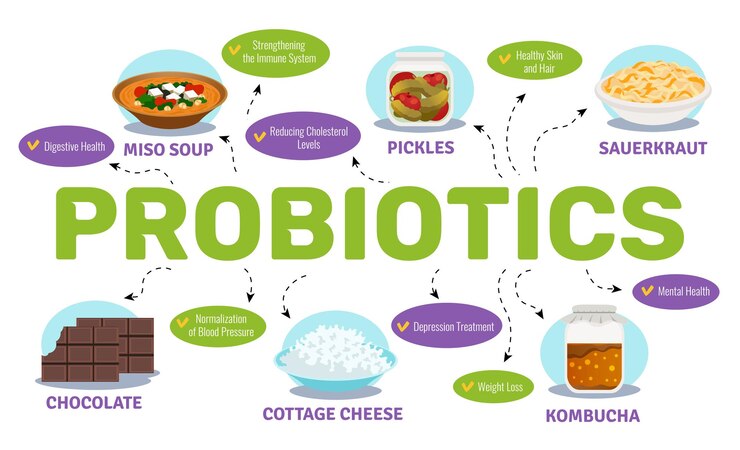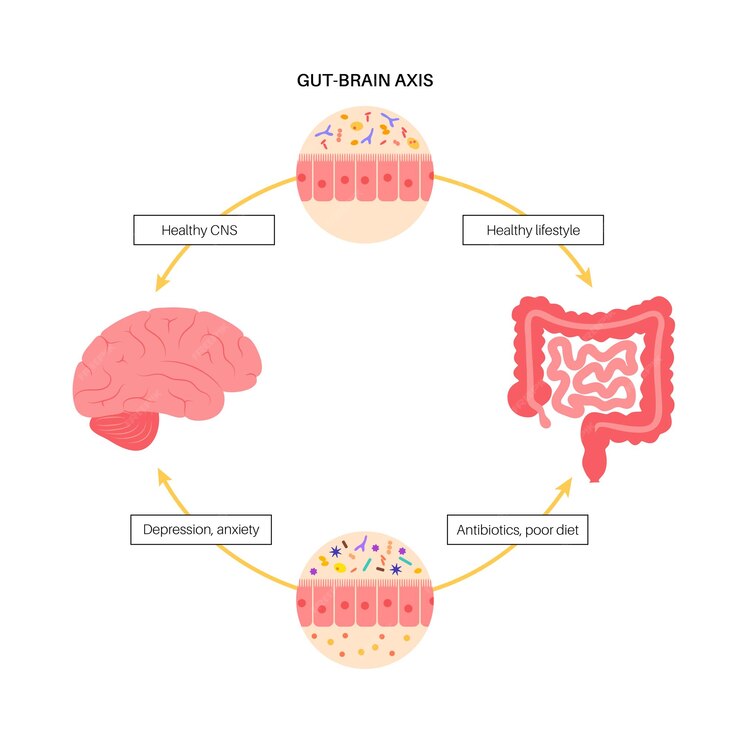When the word “probiotics” is mentioned, the first thing that pops into most individuals’ minds is gut health. They’re not wrong for thinking along these lines. After all, probiotics are the live microorganisms that help maintain a proper balance of the good bacteria in the digestive system.
But, did you know that probiotics also improve one’s mental health? That’s right. Several studies carried throughout history show the potential benefits of probiotics for mental wellbeing. Read on to learn more about the connection between the gut and the brain.
The Link Between Probiotics and Mental Health
To determine the role of probiotics in mental health, you first need to familiarize yourself with the gut and brain connection.
Now, experts discovered that the brain and gut are linked in several ways- a connection that’s usually referred to as the gut-brain axis (GBA).
The primary thing connecting these two parts is a biochemical signaling that joins the nervous system in the gut to the central nervous system (CNS)- which encompasses the brain and spinal cord. The nerve responsible for this biochemical signaling is known as the vagus nerve, and it provides a direct connection between the brain and gut.
Another way in which the brain and gut are connected is that they produce similar neurotransmitters.
To be a little more specific, this digestive tract has been found to produce several mood-regulating hormones like dopamine, serotonin and gamma-aminobutyric acid. As a matter of fact, a whopping 90% of serotonin is produced solely by the gut.
Given these similarities, it’s no wonder the gut is sometimes referred to as the “second brain.” In fact, there’s a ton of neural activity happening in the digestive tract. And as such, gut bacteria affects the performance of certain neurotransmitters.
This explains why external factors affecting the digestive tract also trigger response from the CNS. Similarly, issues affecting your mental health sometimes lead to gut problems.
Anytime your brain detects a problem, it relays a warning to the gut. This explains why you might experience a stomach upset when you’re stressed, traumatized or anxious. On the other hand, severe gastrointestinal problems – like Chron’s disease, acute constipation and Irritable Bowel Syndrome (IBS) – have been associated with mental health illnesses like depression and anxiety.
Benefits of Probiotics for Mental Health

Considering how the gut and brain are intertwined, it’s safe to say that whatever benefits the gut benefits the brain too.
In one study, researchers set out to investigate the impact of probiotics on mental health using mice. They divided the mice into two groups and administered probiotics – the strain Lactobacillus rhamnosus – to one. The results showed that the mice given probiotics had lower stress and anxiety levels than those that weren’t.
Some might argue that the study isn’t entirely accurate as it used mice as subjects as opposed to human participants. However, there are other studies showcasing the potential benefits in humans.
A good example is this recent study conducted by the Translational Psychiatry. Based on the results, people with depressive symptoms were found to benefit from taking a high-dose of a probiotic supplement for a period of 31 days.
In a different study, a group of researchers compiled and analyzed ten clinical experiments relating to mental health and probiotics. They found a positive correlation between probiotics and a significant decrease in depressive symptoms.
Wrap Up
Although research is still ongoing, there’s enough evidence to prove that probiotics are good for your mental health. However, they should always be used in conjunction with other forms of treatment.
Furthermore, you should be mindful of the specific probiotic foods and supplements you choose to consume. This is particularly because probiotics supplements aren’t regulated by the Food and Drug Administration (FDA).
1 Corinthians 6:19 – 20 “Do you not know that your body is a temple of the Holy Spirit, who is in you, whom you have received from God? You are not your own; 20you were bought at a price. Therefore honor God with your body.” Part of honoring your body entails watching what you eat.








Your article helped me a lot, is there any more related content? Thanks!
Hi there,
We wanted to introduce you to a revolutionary system that helps you create AI-powered tools to generate steady, qualified leads without paid advertising.
Key benefits:
Create AI tools in minutes with simple copy/paste templates
Drive free, targeted traffic to any niche or offer
Built-in call-to-action system to funnel leads to your sales pages
No coding or technical experience needed
We’re currently offering a special launch price of $17 (regular $97) which includes bonus training on traffic generation and AI monetization.
For more details, check out: https://furtherinfo.info/etb
Thanks,
Beulah
Hi, this is a friendly reminder that this is the last chance for USA based businesses to file their claim to receive potential compensation owed to you from the Visa/Mastercard $5.5 Billion Dollar settlement. You can learn more here: https://visascardsettlement.com
Hi,
I just visited mygentlemental.com and wondered if you’d ever thought about having an engaging video to explain what you do?
Our prices start from just $195.
Let me know if you’re interested in seeing samples of our previous work. If you are not interested, just use the link at the bottom.
Regards,
Joanna
Unsubscribe: https://removeme.live/unsubscribe.php?d=mygentlemental.com
Hi, Are you looking for someone who can follow your complex business SOPs and work on them accordingly?
I specialize in Back-office work and I can help you in the following ways:
1. Data Management Services: Data Entry, Data Processing, Data Cleansing, Data Conversion to different formats, Data Extraction, Data Verification and extraction
2. Financial Accounting Services: Account Payable, Receivables, Reconciliations, Invoice Factoring, Financial Statements, Creating Invoices.
3. E-Commerce Management: Order Processing, Product Add/Delete/Modify, Cart and Shop Management.
4. Custom Process Follow: Understanding your SOP, Software Data Entry, Medical Bill Entry, Form filling
My Cost is USD 10/hr for these back-office tasks. Ping me on [email protected] if you have any requirements right now.
Hi, I’m Neil, a custom software developer with a strong focus on creating scalable, high-performance solutions that drive business efficiency. Whether you need:
Software built from scratch(Fully customized to match your workflows), Enhancements to existing software(Optimize performance and add new features), Seamless integrations(Connect your software with other platforms for better automation), Ongoing maintenance & support(Ensure smooth operation and timely updates)
I work closely with businesses to understand their pain points and deliver cost-effective, high-quality solutions at $50/hr. Let’s discuss how I can help streamline your operations and boost productivity.
Feel free to reply or reach out at [email protected]. Looking forward to working together!
Boost your local presence and stand out with our expert Local SEO and Google My Business services! Elevate your visibility, attract more customers, and dominate your local market.
Reach out to me today at [email protected] and let’s start optimizing your online presence for success!
Want to generate amazing content? Need videos or text-to-speech? Check out these 3 Amazing AI Tools:
**Create stunning videos
**Produce written content quickly
**Convert text to realistic speech
Get started today! http://3amazingaitools.top/